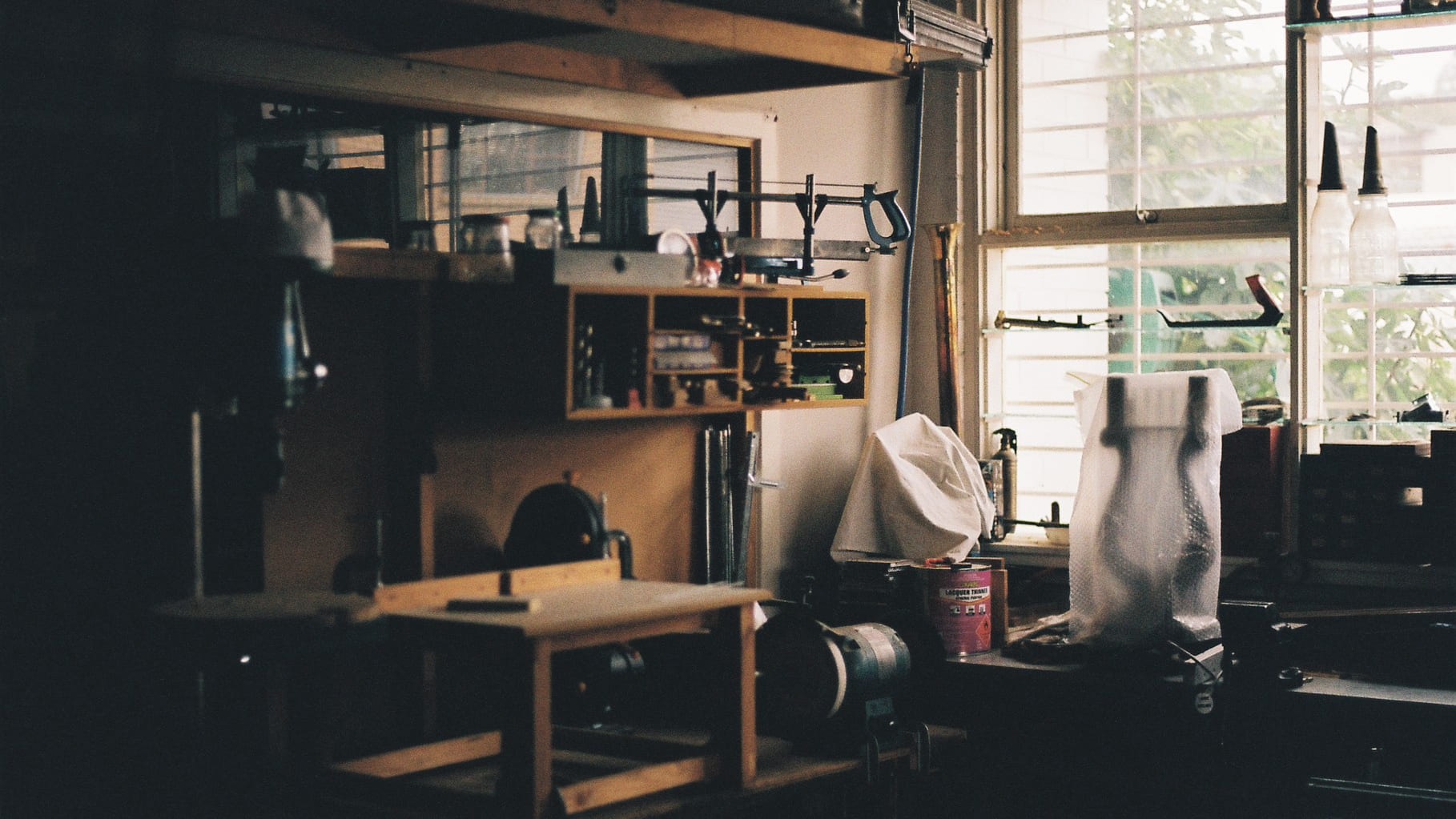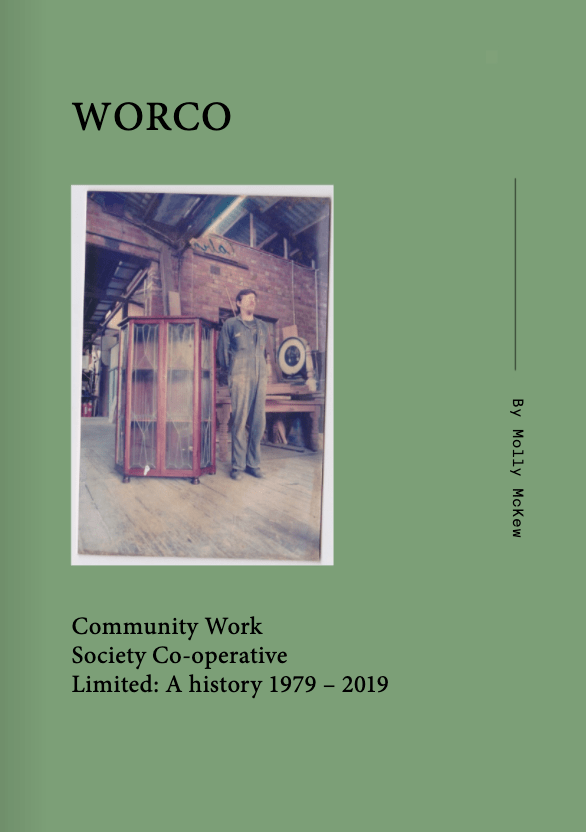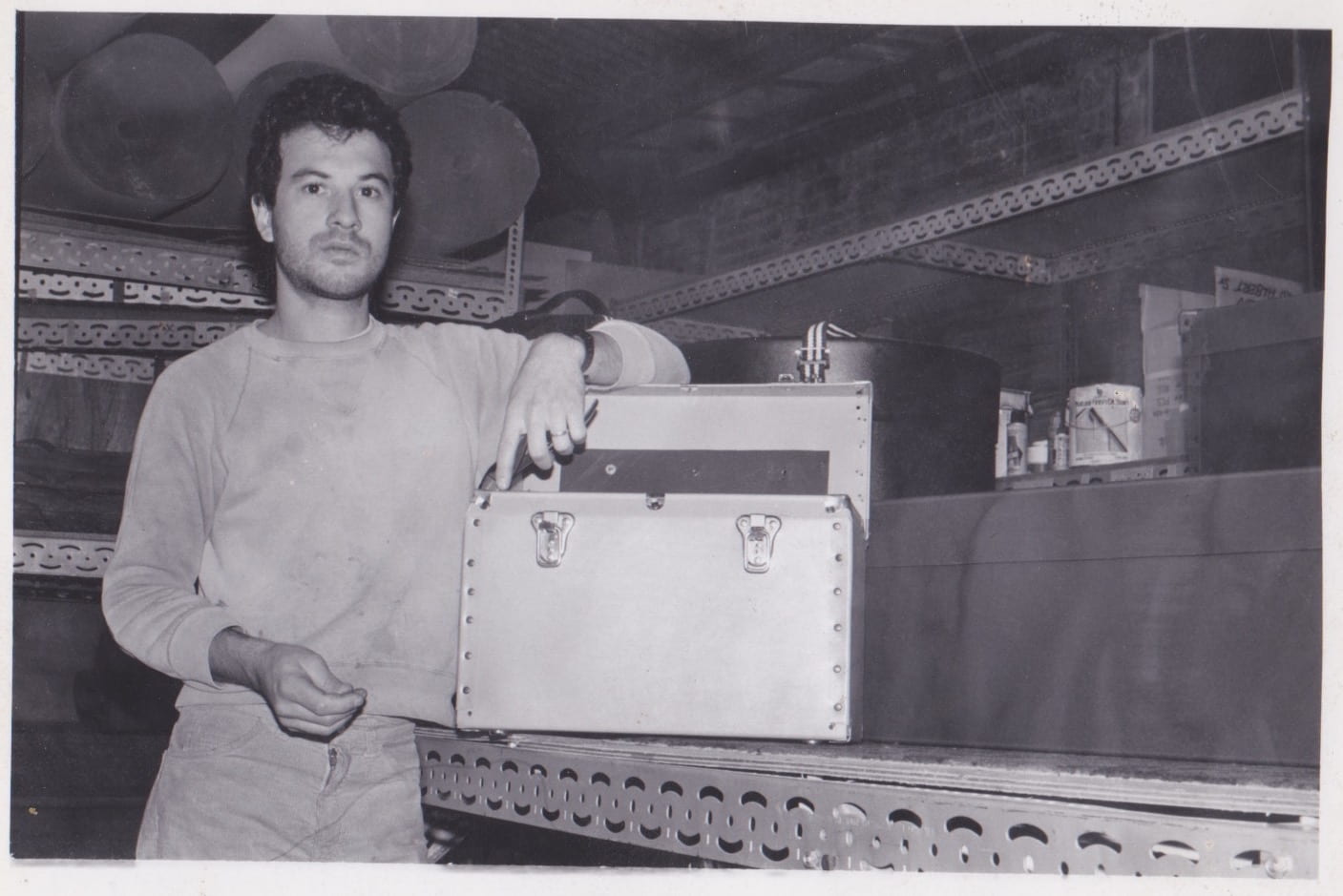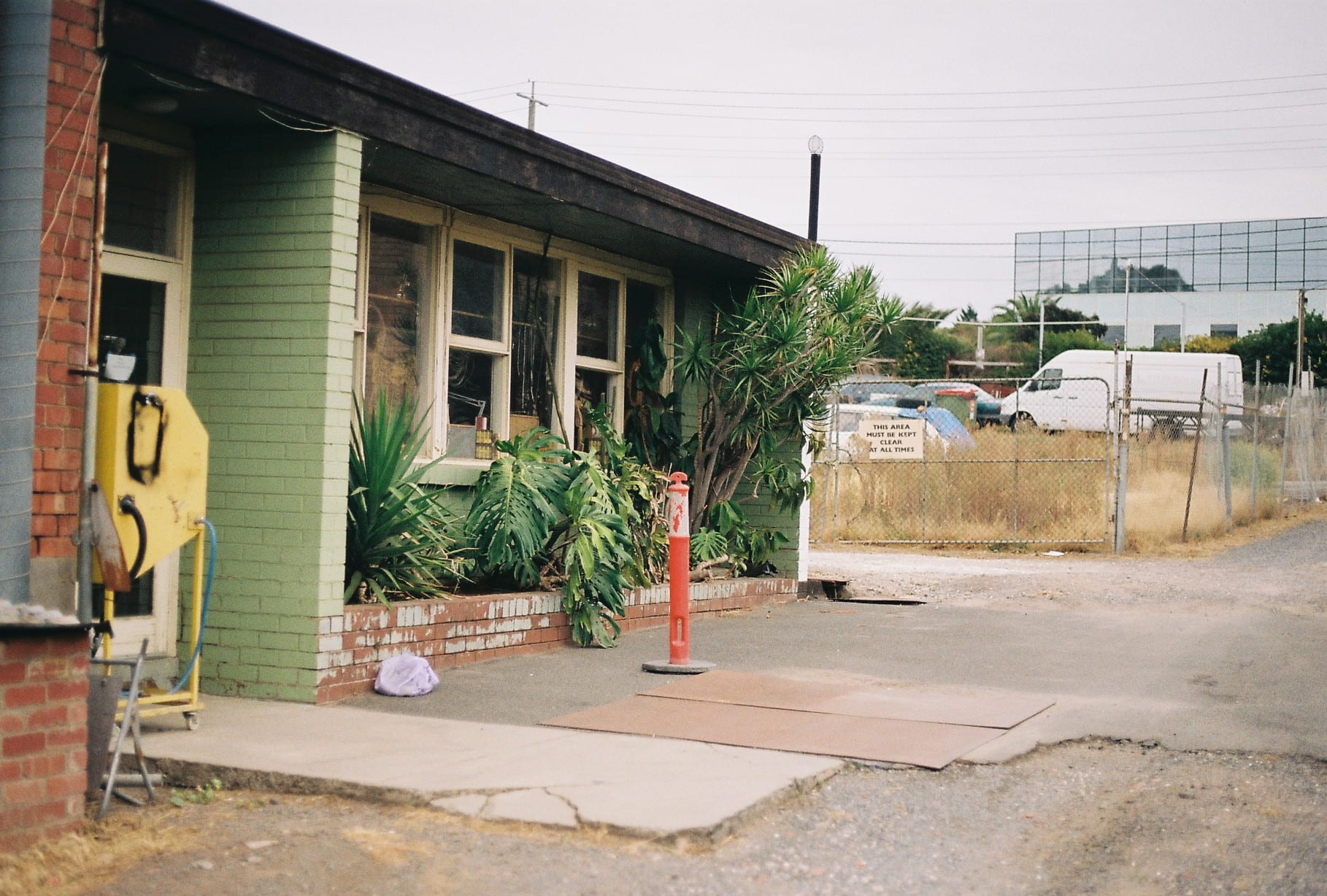
Documenting the History of Worco Crafts Co-operative
After completing her PhD in History in 2019, Molly Mckew was commissioned to write the history of the Preston-based Worco crafts co-operative, to mark the fortieth anniversary of its founding. The project offered Molly the opportunity to build on her knowledge of the history of Melbourne inner-urban lifestyle experiments of the 1960s–1970s, and to apply her research skills in a meaningful community history project. Read an excerpt from the resulting book below.
 Walking into the Worco factory in Preston, in Melbourne’s industrial northern suburbs, is like stepping back in time. Overflowing with the culmination of more than 30 years of habitation, it is packed with materials, paraphernalia, and more tools than you ever knew existed. It is hard to see where one member’s workspace ends and the other begins. At the back entrance, a fridge sits idle with a sign pasted to its side, ‘respect your co-operative’. Just metres away lies a full-sized wooden sailboat. The common areas at the front end of the factory are piled with papers, books and belonging long parted from their owners, and the furniture is antique and well-loved. In the lunchroom and occasional boardroom, the resident cat, Ted (short for ‘adopted’), lounges in the sun, well cared for by Worco members (despite differing opinions about the type of food she should be fed and where to buy it).
Walking into the Worco factory in Preston, in Melbourne’s industrial northern suburbs, is like stepping back in time. Overflowing with the culmination of more than 30 years of habitation, it is packed with materials, paraphernalia, and more tools than you ever knew existed. It is hard to see where one member’s workspace ends and the other begins. At the back entrance, a fridge sits idle with a sign pasted to its side, ‘respect your co-operative’. Just metres away lies a full-sized wooden sailboat. The common areas at the front end of the factory are piled with papers, books and belonging long parted from their owners, and the furniture is antique and well-loved. In the lunchroom and occasional boardroom, the resident cat, Ted (short for ‘adopted’), lounges in the sun, well cared for by Worco members (despite differing opinions about the type of food she should be fed and where to buy it).
For a unique and successful organisation, Worco has kept a low profile. Information about the co-operative on the internet is scant, and press articles are few and far between. This is despite the fact that Worco is one of Australia’s longest-running workers’ co-operatives. Against the odds – many co-operatives that were founded in the 1970s disintegrated after a few years – it celebrated its fortieth birthday in 2019.
Worco, shorthand for ‘Community Work Society Co-operative Limited’, was founded at the tail-end of winter 1978 by a group of parishioners at St Mark’s church, an Anglican parish located in Camberwell, in Melbourne’s east. These parishioners were concerned about high rates of youth unemployment, which had risen sharply in most industrialised countries after the international oil crisis of 1973. By the late 1970s, it had become a significant problem in Melbourne. One Sunday in 1978, a parish member decided to preach to the congregation about the problem of youth unemployment. Afterwards, a group of parishioners got together to talk about how they could help – and came up with the idea of Worco.
Worco’s founding members were a group of 12 well-off professionals, many of whom were semi-retired – some scientists, some business owners, and some doctors. They hoped to combine the skills they had gained in their various fields to help unemployed young people in their community.
Following a fruitful brainstorm that evening at St Mark’s church, they managed to secure a grant of $500 from the Hawthorn Community Chest, some significant monetary donations from parishioners, and the use of a former ice works factory from the Hawthorn Council.

Worco was to be a space in which young people could access the support and resources they needed to start a new business enterprise, which would ideally result in a regular income. It was described in many early articles as a ‘self-help’ organisation – the idea was that unemployed people would help themselves to earn money, rather than relying on unemployment benefits. The founding directors would oversee this activity and provide mentoring and business advice. Further, the directors planned on utilising their business connections to garner support from influential people and generate funding. By 8 June 1979, Worco was fully operational and the group registered itself as a co-operative under the Co-operative Housing Societies Act 1958.
By early 1979, the former ice works at 49 William Street, Hawthorn, was host to a stream of young people who utilised skills as diverse as cabinet making, carpet restoration, pâté making, puppetry, and papier-mâché to start their own businesses. Young unemployed people came and went, sometimes staying for weeks, sometimes months, some undertaking training from teachers who volunteered their time. The founding directors met regularly with Worco’s young participants to make sure their projects were running smoothly.

By 1985, when Worco moved to Preston after being asked to vacate the Hawthorn premises, it had morphed into a shared workspace housing six small enterprises. The move marked a shift in how Worco was funded and organised. Soon, Worco became self-sufficient, moving away from reliance on outside grants and instead charging Worco members rent in exchange for space and a range of amenities and administrative services. Each member was required to become a shareholder of the co-operative, pay a monthly rent, and attend board meetings where they would have a chance to vote on issues affecting the day-to-day operation of the co-operative.
The organisational model they came up with still works. The current Worco site in Preston, a former rag-factory, now houses 17 successful enterprises, with its members ranging in age from 30 to 70. There are more women working at the co-operative than in times past. The community life of Worco has shifted too, with some members running digital warehouses and administering their businesses from home, and some only utilising the factory space at night or on the weekends. In 2020, Worco will move to a new factory, as the owners of the current space, with whom Worco has developed a warm and supportive relationship over the years, have sold the property.
Leading up to its fortieth birthday, Worco remains a thriving community of people who are passionate about their craft. And in line with co-operative values, the members prioritise expert craftmanship, quality products over profit, and a mutually supportive working environment. In 2018, cabinetmakers Eco Wood Design wrote on their Facebook page:
We are part of the Worco co-operative which has been operating on this site for more than 30 years. It includes a diverse group of 20 or so craftspeople – woodworkers, a blacksmith, ceramics, and stained glass. It’s a bit like a large extended family with lots of support for each other, and some arguments going back 30 years which everyone has forgotten the origins of. We are having our AGM on Monday night. Should be a blast.
Molly also told us a little about the project:
In December 2019 I submitted my PhD on the history of Melbourne’s inner-urban countercultures. My research focused on the progressive lifestyle experiments that took place in inner suburbs like Carlton and Fitzroy during the late 1960s and through the 1970s. Part of my research looked at the emergence of grassroots cooperative movements and organisations and housing models run by principles of consensus. So, I was intrigued when I saw an opportunity advertised to write a short history about a Preston-based crafts cooperative called Worco.

I had never heard of Worco or completed a project like it – in fact, I had barely published anything at all. But I was drawn by the idea that my research skills and my interest in the 1970s could be utilised for a real-life project that would have immediate meaning for me and the people that make up the Worco cooperative. Because I had enjoyed the oral history element of my PhD, the idea of interviewing people from the cooperative excited me, as did the idea of dipping my toes into a journalistic mode of writing.

As part of the project, I carried out a series of interviews with current members of Worco. I spoke with each member at length about why they were attracted to Worco, what the cooperative model meant to them, why artisan production is important, and what they loved about their day-to-day life at the cooperative.
All of my interviewees were incredibly passionate about the beauty and importance of unique and well-made products. They welcomed me into their space, were excited to talk about their craft, and had enormous respect for the autonomy and individuality of their fellow members. It was an honour to be given personal insight into these members’ opinions, biographies, and passions.

The final, printed product was typeset and designed in collaboration with a graphic designer friend, Amanda Santamaria. Working together to create a beautiful booklet to help members celebrate Worco’s fortieth anniversary was an exciting experience. Together with the Worco board members, we decided on the design, the typeface, the cover photo, and which pictures were to be included. Hard copies from the small print run we ordered were given to all members, some past members, and friends of the cooperative. There will be a physical launch at the Worco premises as soon as gatherings are again possible.
The history has been made available online on the Worco website as a means of providing information to new, potential members and the general public. Printed copies have also been donated to the Darebin Council and the State Library of Victoria.